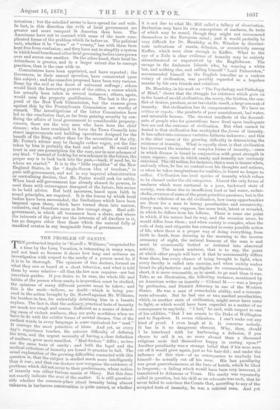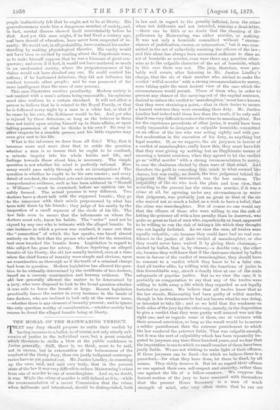THE PROBLEM OF SANITY.
THE protracted inquiry in" Nowell v. Williams," suspended for a time by the Long Vacation, is interesting in many ways, and not least so because it shows how long and arduous an investigation with respect to the sanity of a person must be, if it is to be thorough. The opinions of two doctors, formed on what they saw or heard at a short interview, and what is told them by some relative—all that the law now requires—are but uncertain guides. If you desire to be sure, the whole life and habits of the person whose sanity is in question must be studied, the opinions of many different persons must be taken ; and this is the mode—tedious, no doubt—which is being pus- sued in the action brought by Dr. Nowell against Mr. Williams, his brother-in-law, for unlawfully detaining him in a lunatic asylum. The fact is, that the ordinary, practical tests of insanity are much too rough and coarse. Sufficient as a means of detect- ing cases of violent madness, they are quite worthless when we have to do with the subtler forms of mental disease. One of the earliest words in every language is some equivalent for "mad." It conveys the most primitive of ideas. And yet, as every day's experience teaches, the extreme difficulty of defining the term, and the urgent necessity of having a clear definition of madness, grow more manifest. "Mad doctors" differ ; no two • use the same tests of sanity ; and both the legal and the medical criterions of insanity are found in practice to fail. The usual explanation of the growing difficulties connected with this question is, that the subject is studied much more intelligently than it was ;and that our doctors now recognise the existence of problems which did not occur to their predecessors, whose notion of insanity was either furious mania or idiocy. But this does not exactly indicate the crux of the matter. It is still question- able whether the common-place about insanity being almost unknown in barbarous communities is quite correct, or whether it is not due to what Mr. Mill called a fallacy of observation. Barbarism may have its own conceptions of madness, its tests of which may be sound, though they might not recommend themselves to the European mind ; and it would probably be very difficult for Dr. Maudsley or Dr. Winslow to discrimi- nate indications of mania, delusion, or eccentricity among Kaffirs, which were clear enough to Kaffirs. What to the eye of a Zulu is clear evidence of insanity may be entirely misunderstood or unperceived by the Englishman. The savage in the Andaman Islands who, by wearing a white hat, and nothing else, and calling himself " Lord Palmerston," recommended himself to the English traveller as a zealous votary of civilisation, was possibly regarded as a hopeless maniac by his own friends and relatives.
Dr. Maudsley, in his work on "The Psychology and Pathology of Mind," shows that the struggle for existence which goes on in the heart of an old civilisation, the worry, the friction, the con- flict of desires, produce, as an inevitable result, a large amount of insanity. But civilisation has its compensations. We have no cretins or cagots,—the products of poor nourishment, bad water, and miserable houses. The stunted intellects of the descend- ants of people who for generations have lived upon inadequate fare are not the outcome of civilisation. But what cannot be denied is that civilisation has multiplied, the forms of insanity. It has called into existence varieties hitherto unknown ; and this is the chief cause of the growing difficulty in determining the existence of insanity. What is equally clear, is that civilisation has increased the number of complex forms of insanity,—cases in which disease is found in conjunction with great strength in some organs ; cases in which sanity and insanity are curiously entwined. The old notion, for instance, that a man is insane when, and only when, he has no control over his thoughts and actions, or when he takes imaginations for realities, is found, no longer to suffice. Civilisation has bred species of insanity which refuse to be classed under the old categories. Almost the only forms of madness which were nurtured in a poor, backward state of society, were those due to insufficient food or bad water, melan- cholia, or excess of some of the great primitive passions; but in the complex relations of an old civilisation, how many opportunities are there for a man to betray peculiarities and eccentricity. Every man, we may suppose, has some trait, latent or revealed, in which he differs from his fellows. There is some one point in which, if his nature had its way, and the occasion arose, he would differ from them ; and when society is complex, when the code of duty and etiquette has extended to every possible action of life, when there is a proper way of doing everything, from birth to death, from dressing in the morning to the inverse ceremony of night, the natural humour of the man is and must be occasionally fretted or irritated into abnormal activity. The latent madness, that is to say, the point at which other people will have it that he unreasonably differs from them, has every chance of being brought to light, when every faculty is called into exercise, and when society makes broad its phylacteries and multiplies its commandments. In short, it is more reasonable, so to speak, to go mad than it was. Take, as an illustration, the following instance, mentioned by an American writer on insanity :—Colonel M--- was a lawyer by profession, and District Attorney in one of the Western States. He was a man of remarkable ability, and a consum- mate advocate. But he had one or two marked peculiarities, which, in another state of civilisation, might never have come to light, or which would have been regarded as a matter of no consequence to anybody. "I feel," he said, with respect to one of his oddities, "that I am cousin to the Duke of Wellington and to Napoleon. It seems ridiculous. I can't make out any kind of proof. I even laugh at it. It concerns nobody. It has in it no dangerous element. Why, then, should I be interfered with for harbouring a delusion, if you choose to call it so, no more absurd than a thousand religious sects feel themselves happy in resting upon P" Another peculiarity was a strange belief that if his nose were cut off it would grow again, just as his hair did ; and under the influence of this view—of no consequence to anybody but himself—he actually cut off his nose. His last peculiarity was great quarrelsomeness at the bars of hotels, which he liked to frequent,—a failing which would have been very innocent, if transferred to Arkansas or Texas. His sanity was repeatedly called in question, but his skill as an advocate was such, that he never failed to convince the Courts that, according to any of the accepted tests of insanity, he was a rational man. And yet
people instinctively felt that he ought not to be at liberty. His quarrelsomeness made him -a dangerous member of society, and, in fact, mental disease showed itself unmistakably before he died. And yet this mem might, if he had lived a century ago, .al been devoid of education, have never been suspected of in- sanity. He would not, in all probability, have confused his under- standing by making physiological theories. His vanity would not have been so excited by reading about the Napoleonic wars, as to make himself suppose that he was a kinsman of great con- querors; and even if it had, it would not have mattered so much in an uneducated society, where the preposterousness of his claims would not have shocked any one. He could control his aations ; if he harboured delusions, they did not influence his conduct towards other people ; and he was possessed of far more intelligence than the mass of sane persons.
This case illustrates another peculiarity. Modern sobiety is not content with a man's actions being reasonable ; his opinions must also conform to a certain standard, It will not allow a person to believe that ho is related to the Royal Family, or that he-is followed every night by a man in a white hat, or that if he came by his own, the Kohinoor would be his. And. yet who is injured by these delusions, so long as the believer in them does not insist upon mixing himself up in State affairs, or upon taking possession of what he thinks is his own P He may in ether respects be a sensible person, and his little vagaries may even give zest to his life.
What is the inference we draw from all this P Why, that it becomes more and more clear that to settle the question whether a man is so insane that he ought to be confined, • a minute inquiry into his whole habits and life, and • feelings towards those about him, is necessary. The simple question is not whether his mind is perfectly rational. How many would pass safely through such an investigation? The question is whether he ought to be his own master ; and every detail of conduct, the smallest acts and circumstances—in short, comprehensive evidence, such as has been adduced in "Nowell v. Williams "—must be examined, before an opinion can be • safely formed. The actual process is very different. Two doetors have a short talk with the supposed lunatic ; they go to the interview with their minds prepossessed by what has • been told them by his friends ; they judge of his sanity by the inspection of a small segment of the circle of his life. The law fails even to secure that the informants on whom the • doctors must rely, know his habits. The " order " need not be signed by any one wile is intimate with the alleged lunatic. In one instance in which a person was confined, it came out that the "connection" of which the law speaks, was based almost entirely on the fact that the person who asked for the detention had once knocked the lunatic down. Legislation in regard to this subject has gone far astray. Before depriving an alleged lunatic of his liberty, the old law usually insisted, even at a time ',when the chief forms of insanity were simple and obvious, upon an examination as thorough as if the truth of a criminal charge had been in question. Modern legislation has allowed the ques- tion to be virtually determined by the certificate of two doctors, • hased on a cursory examination and hearsay evidence. The old law generally allowed the matter to be determined by a jury, who were disposed to look to the broad question whether it was safe to leave the lunatic at large. Recent legislation practically leaves the matter in every instance in the hands of -two doctors, who are inclined to look only at the narrow issue, —whether there is any element of insanity present ; and to ignore the only question worthy of consideration,—whether society has reason to dread the alleged lunatic being at liberty.



































 Previous page
Previous page